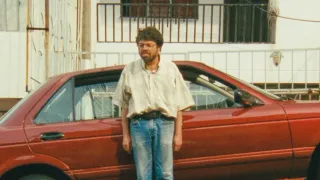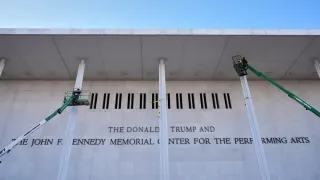March 11, 2017
Suit Raises Concerns About SF DUI Cases
Seth Hemmelgarn READ TIME: 5 MIN.
San Francisco's former chief forensic toxicologist has filed a wrongful termination lawsuit against the city that's raising concerns about DUI analyses and other work performed by the man who replaced him.
In a civil complaint filed in February in San Francisco Superior Court, Dr. Nikolas Lemos says he quit after he was "instructed ... to engage in unlawful activity" by assisting "an unlicensed forensic toxicologist to illegally perform DUI alcohol testing."
That "unlicensed" toxicologist, Dr. Luke Rodda, replaced Lemos in July 2016 after Lemos resigned. Rodda, who didn't respond to interview requests, is still serving as chief toxicologist, according to court documents and Rodda's LinkedIn profile.
Lemos, a gay man who had worked as the city's chief toxicologist since October 2003, declined to discuss the case, but Rob Nelson, his attorney, said that if he were representing anyone who'd been "brought up on DUI charges in relation to testing that Dr. Rodda did, then I would be looking very carefully at whether it was appropriate for him to conduct the tests."
As the city's chief forensic toxicologist, Lemos conducted and supervised "testing to determine whether there were drugs or alcohol in victims of sudden, unexpected, or violent deaths, as well as in living people charged with crimes such as sexual assault and driving under the influence," Lemos' complaint notes.
With Rodda now in the position to perform those duties, Public Defender Jeff Adachi said in an interview, "We are extremely concerned" about Lemos' allegations.
"The allegations are extremely serious and have far-reaching implications, both in terms of specific cases that Dr. Rodda worked on, as well as calling into question the procedures and protocol" in place "for dealing with these kinds of problems," Adachi said.
Title 17
Lemos' lawsuit delves into Title 17 of California's Code of Regulations, which addresses DUI analysis. Among its other tasks, the medical examiner's office performs forensic toxicology analyses on people who've died as well as analyses in DUI cases.
"Title 17 requires that technicians conducting DUI tests have various certifications from governing boards and state departments in the areas of forensic toxicology and alcohol analysis," the court documents say. "Only appropriately educated and certified scientists can conduct forensic alcohol testing on DUI suspects in California."
The city hired Rodda in May 2016. After reviewing materials that Rodda provided, Lemos concluded that the he "likely did not have the necessary academic and professional credentials to be certified under Title 17," the complaint says.
Lemos says in his filing that he notified Christopher Wirowek, the medical examiner's deputy director, who told him " 'not to do the job' of the state certification authorities and ordered him to nominate Dr. Rodda for certification anyway."
Wirowek also told Lemos "to 'comply now and grieve later,' " the complaint says.
Lemos then went to the city's General Services Agency, which handles human resources matters for the medical examiner's office. He told two GSA employees that allowing Rodda to conduct DUI testing "would break the law, and that Mr. Wirowek seemed unconcerned with these facts."
The GSA staffers told Lemos they would "report his complaint to their supervisor," but he alleges that was the last he heard from the agency about his complaint.
Despite Wirowek's instructions, Lemos "would not allow Dr. Rodda to conduct any forensic alcohol testing by himself," according to Lemos' filing. Lemos "and his staff therefore handled the DUI testing that Dr. Rodda otherwise would have done had he been properly certified."
In early July, the state's forensic alcohol program notified Lemos that it wouldn't certify Rodda, and the earliest Rodda "could reapply for certification was in two years," the complaint says.
Lemos claims that Wirowek refused to release Rodda and replace him with someone who had the proper qualifications.
"Mr. Wirowek told plaintiff that firing Dr. Rodda would reflect badly on Mr. Wirowek, likely given that he had personally recruited Dr. Rodda from Australia at considerable expense to the city," according to the complaint.
Lemos claims that Wirowek told him not to tell anybody else about Rodda's rejection, and to allow Rodda to perform DUI testing and his other "job duties in full," so the agency could eliminate the backlog that had developed from other staff having to do DUI testing for Rodda.
"Mr. Wirowek's instructions put plaintiff in an untenable situation," the complaint says. "If he was to sign off on Dr. Rodda's test results and then attempt to support them in criminal trials, he could be guilty of perjury. Conversely, if plaintiff refused to support the test results and it was ever learned why (i.e., because Dr. Rodda was conducting the tests illegally), then plaintiff's professional integrity would be damaged irreparably for having knowingly allowed an unlicensed toxicologist to conduct DUI tests. Either way, plaintiff could not carry out Mr. Wirowek's mandate to allow Dr. Rodda to be involved in DUI testing."
On July 18, Lemos "begrudgingly resigned."
Nelson, Lemos' attorney, said that forensic toxicology is "a small field," and Lemos "very much believed" that "if word got out that he was knowingly working in violation of the law, he likely never would have worked in the field of forensic toxicology again."
Wirowek declined to comment on the case and hung up on a reporter. The complaint doesn't list Rodda, Wirowek, or other individuals as defendants.
In response to an email from the Bay Area Reporter, John Cote, a spokesman for the city attorney's office, said, "We're not going to comment on pending litigation."
No one from the GSA responded to an interview request for this story.
Ron Owens, a spokesman for the state public health department, which oversees the forensic alcohol program, wasn't able to provide comment.
Attorneys' Concerns
Adachi, who first learned of Lemos' allegations when the B.A.R. sent the complaint to his office, said his staff is reviewing cases that include reports that Rodda was involved in.
"We will be doing our due diligence in terms of calling for an investigation of these allegations, and also any impact that [Rodda] had on cases," Adachi said.
Carmen Aguirre, who oversees all the DUI cases in Adachi's office and serves as the misdemeanor manager, said noncompliance with Title 17 "definitely affects any and all cases of license suspensions" through the Department of Motor Vehicles.
"Title 17 compliance is required for anybody that's signing off on a report for the report to be considered for license suspension," Aguirre said.
Rodda's alleged noncompliance with Title 17 "may mean less in criminal cases than it means" in DMV cases, but "we'll be investigating," she said. (A DMV spokesman declined to comment on the lawsuit.)
Lemos' complaint noted that he often testified "in criminal trials regarding his test results," and he "had to sign written attestations verifying tests that he had done himself, as well as tests performed by his staff."
Aguirre said Lemos "was very fair to both sides," and he's "always been of the highest ethical standard."
Since Lemos' departure, though, "We've seen a real decline in both the responsiveness of the medical examiner's office, and also just knowing who's going to testify and the fairness of the person who does testify," she said.
Rodda hadn't testified in any of her cases, Aguirre said, but there are still concerns "with anything he signs off on."
Alex Bastian, a spokesman for the district attorney's office, said, "As it relates to the Title 17 issue, given that [Rodda] has not testified or worked on any of the DUI cases" that prosecutors have handled, Lemos' allegations "will likely not impact any DUI cases."
Bastian declined to comment on Adachi's concerns about the potential impact on other cases.
Through his lawsuit, Lemos is seeking unspecified damages for retaliation, wrongful termination, and "constructive discharge."
Nelson said that term means "the conditions are so intolerable you basically have no choice but to resign."
Lemos so far hasn't found a new job.






